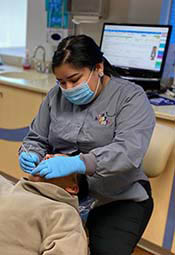If you have braces (or are going to get them), your dentist or orthodontist might have mentioned tightening. (We know that we tell our patients here in North Carolina and Southern Virginia about it on their first visit!) They, or possible friends or family, might have also mentioned the pain that comes with getting braces tightened. Traditional bracket and wire braces need to be adjusted or tightened from time to time, and so you should know what to expect when this happens.
Why Do Braces Need to Be Tightened?
To understand why you need to get braces tightened, you need to know how they work. By exerting force on your teeth, braces slowly move your teeth through the soft gum tissue of your mouth. Traditional braces use a system of wires connected to brackets, which in turn are cemented onto your teeth. The wire pulls on the brackets, moving your teeth.
It is almost never the case that you can get braces to move your teeth from where they are now to where you want them to end up. Not only would the pain be unbearable, but you might end up hurting your teeth!
Instead, orthodontists do braces in stages. At first, the wires are exerting a lot of pressure on your teeth. But over time, as your teeth move, they exert less and less pressure. Eventually, they are exerting little pressure at all. This is when you need to have a braces adjustment, or tightening.
How Often Do You have to Get Your Braces Tightened? How To Tell It’s Time for Tightening
Usually, your orthodontist will tell you when the time is right for tightening your braces. He or she will recommend having this done when they are seeing little or no movement of your teeth over time, or if they notice any components that are loose.
Every mouth is different, so there is no one way of knowing how often your braces need to be adjusted. Orthodontist typically schedule check-up appointment for every 4-6 weeks, because that seems to be the average amount of time needed between adjustments. That said, you might need them more or less often.
A few telltale signs that you might be ready for tightening include:
- No pain from your teeth or gums at all, even when you bite down on tough food.
- Brackets come loose.
- Your teeth do not feel added pressure (like they are swollen) when you press them together with force.
What is the Process of Tightening Like?
Many of our patients in North Carolina want to know what to expect when you get your braces tightened. We get it: There are a lot of appointments involved, and past patients often mention the discomfort.
During an appointment for adjustment, your orthodontist will first take a close look at your mouth to see how you are progressing and to see if there are any problems. Adjustment is also a time to replace worn bands, add spacers, and address any issues with pain or discomfort (for example, if a wire is poking your mouth).
During the tightening process itself, your orthodontist will fit your wire to your brackets so that they will continue to exert pressure. He or she may even remove your wire and replace it with a new one.
When the process is done, it might not seem like much is different – just as if you had a trip to the dentist. That said, there is usually some soreness and/or sensitivity that develops right after tightening and last for a little while…
How Long Do Braces Hurt After Tightening?
Yes, it is quite common for there to be pain or discomfort after getting a braces adjustment. The good news is that, for most people, that pain goes away by itself after a day or two. Some report having no pain at all.
Much more common than direct pain is a certain kind of sensitivity after the adjustment. Your teeth or gums might not hurt while going about your day, but will hurt a lot when you try to eat, for example. For this reason, most people avoid tough or hard foods and stick to meals that do not require chewing (soup, yogurt, stew, smoothies, etc.).
If the pain gets to be much, using over-the-counter painkillers, like ibuprofen and acetaminophen, can help. Be sure to follow the directions on the bottle.
Finally, cold has been reported to help alleviate the pain somewhat too. An ice pack can certainly help – but, seeing as many of our patients live in North Carolina, they usually use the excuse to get a nice cold drink of sweet tea, or maybe some frozen yogurt.
Still Thinking About Getting Braces?
Getting braces is a major decision. But it is a decision that few ever regret. We here at MyOrthodontist are proud of the work we do to get our patients the smile they so desperately want.
If you want us to walk you through the process, simply contact us. Or, alternatively, schedule an initial consultation at one of our locations. Our MyOrthodontist offices provide some of the best orthodontic services in the nation, and we love helping our patients!


